The Apple fan behind the Every Apple TV ad YouTube channel has created a new channel and blog with the self-explanatory title Every Steve Jobs video, offering a total of around 150 clips of varying lengths.
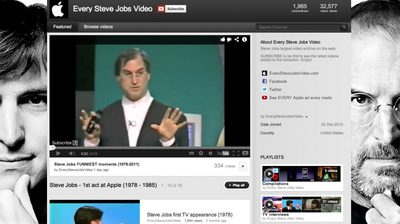
The site's creator told MacRumors that he wanted to get them online in time for Steve Jobs' birthday on February 24.
I'm a long time Apple enthusiast and throughout the years have gathered every single Steve Jobs video I could find … To commemorate Steve Jobs birthday (Feb. 24th) I decided to put all these videos online and make them easily available for all. I believe it's the most complete archive available.
Highlights include Steve's first TV appearance, where he told the crew he was about to throw up from nervousness; the launch of the Macintosh, including the famous 1984 video and Jobs making fun of IBM; and the launch of the Think Different campaign. It also includes some amusing compilations including Steve Jobs' Funniest Moments and Every 'One More Thing' Moment, all 31 of them.





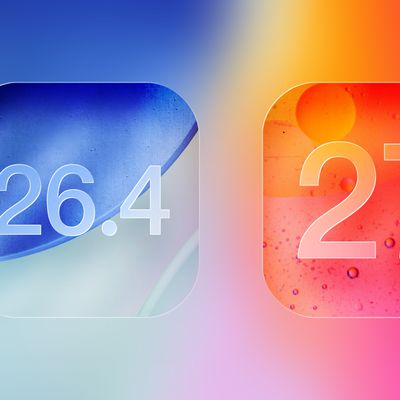

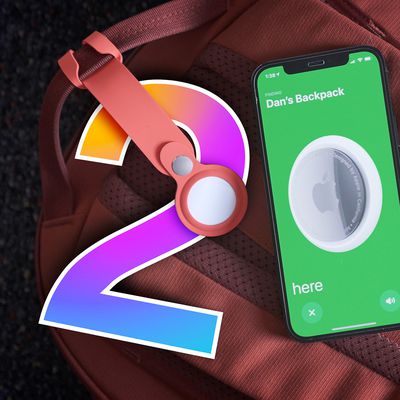



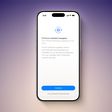








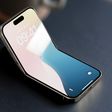




Top Rated Comments
Source: //www.youtube.com/EverySteveJobsVideo (//www.youtube.com/EverySteveJobsVideo)
Go to 3:20. The audience pan across and you see Sergei the sole person not amused.
You can't miss him. He's dressed as Tom Cruise from Risky Business.
----------
NeXT Computers weren't outdated. They were more advanced than the competition. Steve learned at NeXT to be less ahead of the competition if you want to win the markets.
People were dealing with Windows 3.11 and NeXTStep 3.3 was out. It was light-years ahead. The hardware on SPARC and HP Gecko were true workstation class hardware carrying on the expensive tradition of hardware for heavy work. The Intel port allowed PCs but only a few vendors paid the $5k certification fees to be on the list.
Then the User License: $795 and Developer: $4995. The University License for both: $299.
We were way ahead of everyone else. That was the problem. We were 5 years in many areas or more ahead. No one got it. Steve woke up and slowed down the tech to be either a bit behind, right at or a bit ahead of the competition which allowed people to grasp the future more easily.
People didn't get Display Postscript to Postscript Printing for WYSIWYG in 1992. They didn't get Fax Modems built-in handling all your paperless documentation. They didn't get a lot that people now still don't seem to get as FAX is still highly used but people still buy those crappy HP fax machines.
People truly didn't get Object-Oriented Programming outside the Enterprise until around OS X 10.4. People fought it.
Now people today laugh at those that don't get it.
Change too far ahead is what killed NeXT. That and Bill Gates and Adobe screwing us over, not to mention a certain group inside IBM who didn't like how fast NeXTSTEP ran on IBM hardware and made IBM UNIX look like a child next to it so they ran NeXTSTEP in emulation during demos to the top brass who canned the partnership.
Steve learned a lot about back stabbing from partners and getting the right people on-board in legal, design, manufacturing, channel distribution and more who had all the connections so when the iPod or iPhone arrived all i's were dotted and t's were crossed.
Steve Jobs and Bill Gates have done more for the world in their professional careers than they could ever do in their philanthropic careers.
Many people would argue that this is the defining difference between Apple and Microsoft and the very reason so many people love Mac and hate Windows. Steve was a visionary not a engineer.
I might get hung for this; but part of the genius of Jobs wasn't his knowledge of computers, but his lack thereof. He certainly knew a thing or two about technology but Woz (and modern day Apple engineers) know a whole lot more. That lack of in-depth knowledge led him to envision products that were outside the scope of ability. A lot of Apple engineers have mentioned him demanding impossible things, but he somehow drove and led them to do it anyway.
He wasn't a genius because he knew how to build it, he's always had fantastic engineers behind him for that. Really just because he had an idea of what the customer would want (even if it's not what they say they want. If you're an Apple user, surely you've had at least one experience where on-paper, it sounded awful, then you used it and the lightbulb went on and you said 'Oh wait, now it makes sense, this is awesome!"). Apple still has the engineering power that brought us all those great products. But I don't know that it'll ever have the drive or ridiculous scrutiny of a guy like Jobs.